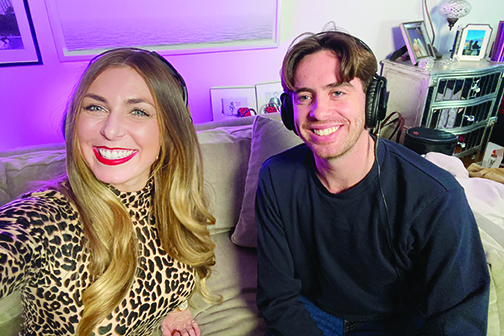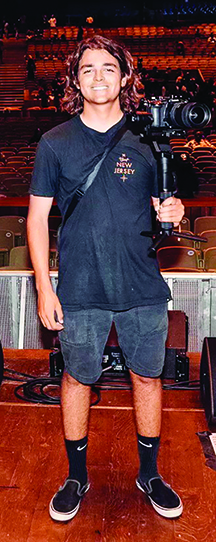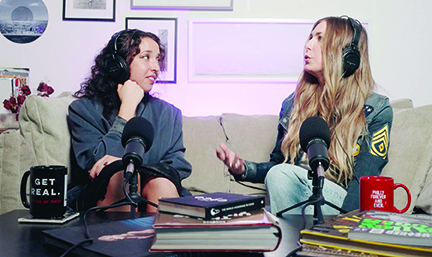Ocean City native talks about her own struggles as she interviews guests on overcoming theirs
OCEAN CITY — Looking at glamorous lives on social media platforms can be deceiving because what appears is carefully curated. It can make everyday people whose realities are not so spectacular reluctant to open up about their own imperfect lives.
Even when polished media-savvy celebrities reveal some of their own hidden turmoil, how can a regular person relate to that?
That is where Maddie Brady is stepping in.
The 2015 Ocean City High School graduate, now living in New York City, has created a mental health podcast called Get Real with Maddie Brady. In interviews with invited guests, Brady shares her own mental health journey about overcoming eating disorders and alcoholism as she gets guests to open up about their lives.
“Initially it was hard to talk about my own mental health journey,” Brady said in a recent interview with the Sentinel. She would post an Instagram caption now and then, something along the lines of, “I was doing bad but now I’m really great.”
She realized that was a disservice.
“I wasn’t telling the whole story. There are so many steps in between. And there are so many hard times in recovery, whether addiction recovery, eating disorder recovery, whatever someone is going through,” Brady said.
“It’s not just rock bottom and then sunshine and rainbows. I felt that I wanted to highlight that to help people … and let them know that they’re not alone. I know that years ago, back in my darkest days, that was the worst feeling, the sense of being alone.”
The journey down
Brady’s journey downward began when she was 17. The competitive cross-country runner had been injured twice her junior year and in her best season ran the whole time with mono. The summer before her senior year, she just wasn’t motivated to train hard.
As the season began, she had a change of heart and wanted to compete, “but it was a little too late.”
She started to lose a little weight. Brady was using that as a coping mechanism with other things going on in her life and realized the weight loss helped lower her racing times. She also discovered it was an easy solution.
Instead of addressing her issues, things got progressively worse.
“I felt like I fell deeper and deeper into it senior year in high school.”
She became anorexic. Bulimia would follow about two years later. Alcohol abuse fell into it as well.
Brady said there often is a progression from anorexia to bulimia, to binge eating and purging.
“At the time I was like, ‘what the heck is happening?’ But that is a pretty normal path if you don’t get help.
“I initially began coping with my eating disorder through alcohol to escape those thoughts. Also looking at my life and my teenage years, I always felt a little bit awkward or a little shy in social situations, which is pretty funny to think about now,” she said, given how she is so public. “I just felt like I used alcohol as a social lubricant at parties and I thought it made me into who I always wanted to be, but in reality it was making me the polar opposite.”
“It seems once it gets going, it gets darker and darker. It progressed quickly. You get yourself into situations and then you’re trying to forget those situations and it spirals pretty quickly. Eventually everything spiraled together and my life was completely out of control and I had to get help.
“It was the best decision I ever made.”
The climb back up
Brady credits family members with getting her on the right path.
“It was loved ones who eventually convinced me to get help,” Brady said. “Cousins and my aunt and uncle played a really large role in getting help. There was a mix of family, mom and dad eventually, my grandmother and even an old coach of mine. She and her husband helped me astronomically.” Others in the athletic community helped her as well.
“My first step was reaching out to people. I was completely closed off. I pushed them away. I was hurting so many people I loved,” she said.
Her initial motivation to seek help was because of those around her. Then she looked inward.
“It was more initially that I didn’t want to hurt other people and then it became, ‘OK, I actually want help for myself. I can be better than this.’”
Brady happens to be the namesake of her grandmother, Madelyn Ann McCormick. Her grandmother was diagnosed with cancer and was given less than a year to live. She lived another 11 years.
“I feel like a lot of my resilience comes from her,” Brady said. “She also helped me a lot when I was going through my eating disorder. She would be going to chemotherapy and she would be worried about the other people in her life. I took a lot of lessons away from her.”

From helping herself to helping others
Brady felt so alone during her personal ordeal, fearing no one else was going through the same thing. During her recovery, she realized that wasn’t the case.
“Once I started asking for help and talking to others, especially in the athletic community, that’s where (I found out) a lot of people I knew had eating disorders and had gotten through them. And I had no idea.
“I remember thinking I wish I would have known in my darkest days that I could have reached out to these people,” Brady said. “I just want to be a resource so other people feel less alone.”
She knows that movie stars and other people in the limelight are talking about their struggles more openly now, “but what about people in your everyday life, people you actually know? That you feel you can have a conversation with? I want to be an example to say you can get through things and you can get to the other side, especially now that I have built myself a life that I am proud of.”
Brady, who went to Rosemont College and is now a tech recruiter, has become extremely confident in herself. Even though there will be naysayers, she won’t be deterred.
“It’s not going to be for everyone, and I know that some people have negative things to say about it and don’t believe in what I’m doing, but I’m at the point in my life where I’m OK with that,” she said.
“Negative feedback is worth it if I can help a couple people out there.”
Social media as a distorted lens; glamorizing sobriety
Social media, Brady said, contributed to her negative self-image.
“You see these highlight reels with people putting their best angle, their best day, on Instagram and you believe that is reality,” she said. “I want to make it abundantly clear that you’re not a single photograph. You are so much more than that and if you have problems in your life, you’re able to overcome those. … It’s not always going to be an Instagrammable moment.”
She uses social media for her show — Instagram, Youtube, Spotify and TikTok.
“I believe in changing the platform around. I want it to be a tool that instead of feeling inferior and not good enough, to get motivated and feel you’re not the only one going through things.”
Brady said she also wants to “glamorize sobriety.”
“I feel drinking has been glamorized for decades and I want people to know there are options for a fulfilling life beyond substances if they are struggling,” she said.
When she goes out, one thing Brady likes to enjoy are mocktails — drinks mixed like cocktails but without the alcohol.
“I try to show people that just because you are sober does not mean you’re ‘boring’ and there are so many inclusive options out there now for the sober community,” said Brady, who has been sober for four years. “My life got drastically better in sobriety!”
Producing a podcast with family by her side, interesting guests

Nick Brady, a 2018 OCHS graduate who got his bachelor’s degree from Flagler College last year, does freelance video work for production companies and under his own name. He went to New York to shoot a promotional video for his cousin Maddie, who had been doing her own work with not much more than a ring light.
He worked with Maddie, got some B-roll footage, edited it and sent it to her. The reaction was positive.
“She had people texting her, saying, ‘this is amazing, we need more of this.’ She reached out and said, ‘Would you want to come up and do the show?’”
Nick agreed.
They booked a few episodes of the podcast and after filming four or five episodes, he realized the conservations were “really inspiring” and that he enjoyed watching the interviews.
“After that first day I met so many amazing people. I heard so many great stories, I was like I’m fully on board with this,” he said.
It opened his eyes.
“I haven’t been exposed to these type of podcasts. You get these young kids in their 20s who have already been through these crazy things and overcome them and are achieving at such a high level,” Nick said. “I wasn’t exposed to that kind of thing. It was really cool. We’ve had some incredible guests on so far.”
Among the guests have been Matt Fumo, a local athlete many in the Ocean City area know who was paralyzed from the neck down when he was injured diving into the water. Not only did he recover, he now competes in triathlons.
Another local athlete, David Millar, talked about how he started running ultramarathons that helped him get and stay sober.
Kristine Auble and her twin sister are known in beach patrol circles for their rowing prowess and lifeguard competition titles with the Margate City Beach Patrol.
Auble Got Real with Maddie Brady about her battles with eating disorders through her athletic career, how that led her to a spiral of depression and secrecy, and how she also was diagnosed with cancer. Auble started an eating disorder support group in Atlantic County.
Nick Brady said they have picked guests through a combination of knowing people with stories that were valuable to share and since they started posting on Instagram, others have come to them.
“We’ve had people reach out and say, ‘Hey, I love what you’re doing. I would love to talk about doing a podcast. This is my story,’” he said. People on social media are reaching out to them to be part of Get Real.
Maddie and Nick Brady do an episode every Wednesday on YouTube and Spotify and they do four to five Instagram clips a week of those episodes. (Search for Get Real with Maddie Brady on YouTube and and “thegetrealshow” on Instagram.)
“As Maddie said, if we can help a couple people, our job is done. Being able to connect with these people and sharing these stories has been our main goal for now,” Nick said.
Maddie wants to take it as far as they can, to expand their audience and get their message out to as many people as possible.
“As Nick said, he was never exposed to people like this. I just feel like I have met so many incredible people through it,” she said. “I have also reached back out to people I’ve seen on YouTube or people who inspired me, to eventually connect with them and to get them on our show would be a huge goal of mine.”
“I didn’t initially have a plan for how to take this to the next level. The fact I’m able to do it with my cousin is just incredible,” she said. “To be able to incorporate that family aspect as well, because their family did help me so much in recovery.”
Having young guests who have overcome struggles is important because they want young people to hear these inspiring stories, to know they’re not alone.
Learn more by viewing her podcasts or go to the website: thegetrealshow.com.
By DAVID NAHAN/Sentinel staff


